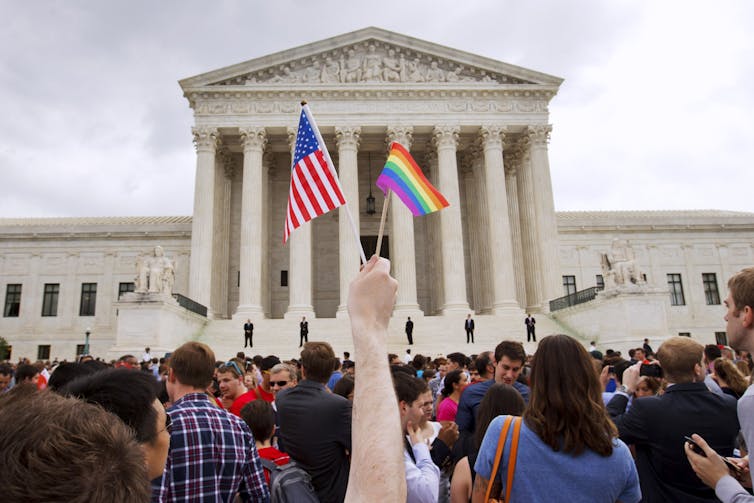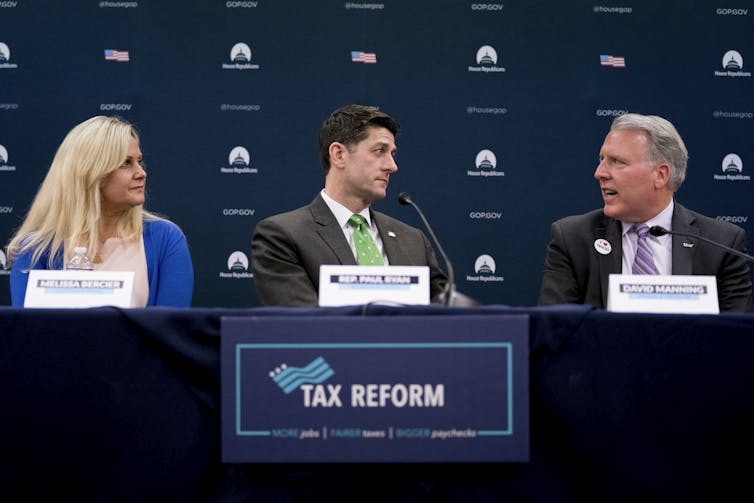How US tax laws discriminate against women, gays and people of color
- Written by Anthony C. Infanti, Professor of Law, University of Pittsburgh
What and how a country chooses to tax says a lot about its values.
A core value built into the DNA[1] of America, for example, is equality. And in practice, Americans imagine[2] their country to be more equal than it is and strive to treat every member of society that way.
But, as I learned in researching my book[3] “Our Selfish Tax Laws: Toward Tax Reform That Mirrors Our Better Selves,” America’s tax laws paint a different picture.
Instead of reflecting a society constantly striving to better itself, U.S. tax laws are mired in the past. They reinforce the social and economic marginalization of women, racial and ethnic minorities, the poor, members of the LGBTQ community, immigrants and people with disabilities.
 Even after gay marriage was legalized in the U.S., same-sex couples still struggle with taxes.
AP Photo/Jacquelyn Martin[4]
Even after gay marriage was legalized in the U.S., same-sex couples still struggle with taxes.
AP Photo/Jacquelyn Martin[4]
Tax and marriage
For instance, U.S. tax law has chosen marriage as the defining characteristic of all individuals when deciding how income tax returns should be filed. That is, most Americans[5] file their 1040s[6] either as “single” individuals or as “married filing jointly.” But even when taxpayers in these two groups have equal incomes, they aren’t necessarily treated equally.
Among married couples, our tax laws give preferential treatment to those whose marriages comport with “tradition” – that is, with one spouse working in the labor market and the other in the home. These couples are rewarded[7] because they pay less tax than if they earned the same amount but hadn’t married.
In contrast, those in “modern” marriages – with each spouse working outside the home – often suffer marriage penalties. These couples pay more tax than if they earned the same amount but hadn’t married.
And “single” taxpayers[8] never receive a bonus but instead often pay more tax than a married couple with the same income.
While the Tax Cuts and Jobs Act[9] passed in 2017 temporarily mitigates the marriage penalties for some two-earner married couples, it fails to address other aspects[10] of the tax laws that contribute to the marriage penalty. Low-income married couples, for example, are still hit with significant marriage penalties under the Earned Income Tax Credit[11].
At the same time, the act increased the bonuses paid to single-earner married couples that provide financial encouragement for one spouse – traditionally, the wife – to stay at home. To take a simple example, an individual making US$100,000 with no dependents who takes the standard deduction would see a 43 percent reduction in taxes in 2018 by marrying a stay-at-home spouse but would have seen a reduction of only about 38 percent in 2017.
The penalty for not marrying increased correspondingly.
Rewarding discrimination
The tax treatment of employment discrimination awards is another example.
Traditionally, personal injury awards[12] have been excluded from taxable income. Courts differed[13] on whether employment discrimination awards were covered by this exclusion, with some courts allowing these awards to be recovered tax-free and others requiring them to be taxed. In 1996, Congress stepped in[14] to end litigation over this issue and decided to take away the exclusion, thus requiring workers to report an employment discrimination award on their federal taxes.
Disadvantaged groups are the ones most likely to suffer from employment discrimination. The top categories of discrimination reported by the Equal Employment Opportunity Commission[15] include race, disability, sex, age and national origin. Members of the LGBTQ community also suffer discrimination[16], but legal protection is not available[17] for them in every state.
All of these groups bear significant monetary and psychological costs[18] as a result of employment discrimination. The awards they are given are intended to help mitigate those costs – to make them whole. Such awards should not be taxed[19] any more than the awards that make victims of car accidents whole for their injuries, which are still covered by the exclusion.
On the other side of the ledger, Congress continues to let employers required to pay these discrimination awards deduct them from their tax bills as business expenses[20].
If the goal[21] is to prevent employment discrimination, it’s counterproductive to penalize victimized workers with a tax while rewarding employers who allegedly or actually discriminated with a benefit.
Again the Tax Cuts and Jobs Act made a nod at reform[22] – and the #MeToo movement – by taking away that employer deduction for settlements in certain sexual harassment cases. But that misses the bigger picture and deeper problem with the tax code.
 Politicians often talk of ‘tax reform.’
AP Photo/Andrew Harnik[23]
Politicians often talk of ‘tax reform.’
AP Photo/Andrew Harnik[23]
Meaningful tax reform
These are but two examples among many of how U.S. tax laws present a distorted picture of what Americans value and the type of society that America aspires to be.
So when politicians talk about “tax reform,”[24] much more is at stake than retaining political power or doling out tax cuts. True tax reform takes time and should entail discussions among the electorate and with politicians regarding the role that the tax laws play in exacerbating social and economic inequality.
That way, Americans can build a tax system that helps create a more just society rather than one that just rewards privilege.
This is an updated version of an article originally published[25] on Oct. 24, 2018.

References
- ^ built into the DNA (www.loc.gov)
- ^ Americans imagine (www.theatlantic.com)
- ^ my book (mitpress.mit.edu)
- ^ AP Photo/Jacquelyn Martin (www.apimages.com)
- ^ most Americans (www.irs.gov)
- ^ 1040s (www.irs.gov)
- ^ are rewarded (taxfoundation.org)
- ^ “single” taxpayers (www.huffingtonpost.com)
- ^ Tax Cuts and Jobs Act (taxfoundation.org)
- ^ other aspects (taxfoundation.org)
- ^ Earned Income Tax Credit (prospect.org)
- ^ personal injury awards (www.law.cornell.edu)
- ^ differed (www.congress.gov)
- ^ stepped in (www.congress.gov)
- ^ reported by the Equal Employment Opportunity Commission (www.lexology.com)
- ^ discrimination (www.latimes.com)
- ^ not available (www.hrc.org)
- ^ monetary and psychological costs (www.eeoc.gov)
- ^ should not be taxed (heinonline.org)
- ^ business expenses (www.law.cornell.edu)
- ^ goal (www.eeoc.gov)
- ^ made a nod at reform (mjbuscalaw.com)
- ^ AP Photo/Andrew Harnik (www.apimages.com)
- ^ politicians talk about “tax reform,” (www.theguardian.com)
- ^ article originally published (theconversation.com)
Authors: Anthony C. Infanti, Professor of Law, University of Pittsburgh

